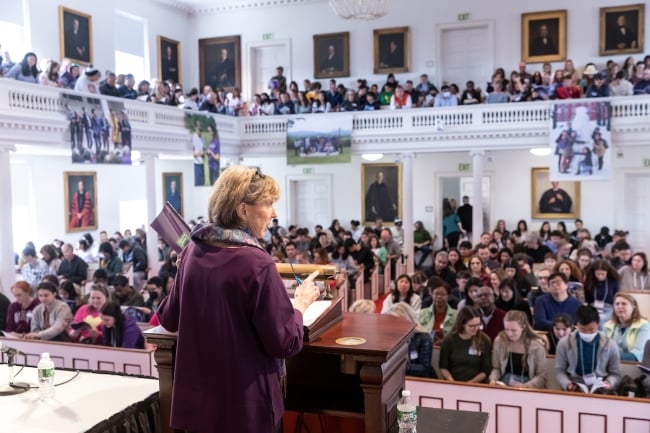You have /5 articles left.
Sign up for a free account or log in.

Program for new Amherst students
Maria Stenzel for Amherst College
Amherst College this year expects to enroll a class that is made up of 6 percent legacy students—those with an Amherst graduate parent.
This is the first class that Amherst admitted without a preference for legacies. Last year, and in recent prior years, Amherst classes had an average of 11 percent legacy students.
The drop in legacy students is significant and may have something to do with other characteristics of the class of new students. Nineteen percent of new Amherst students are the first in their families to attend college. That’s a record for the college.
Amherst announced that it was eliminating the preference for legacy students in October 2021. Because some students had already applied by that point in the year, Amherst did not begin its new policy until the fall of 2022. At the same time, Amherst increased its financial aid (which is based only on need).
Of the incoming class, 38 percent will receive grants (institutional, state and federal) that fully cover tuition, and 17 percent will receive grants that cover the total comprehensive fee (including room and board).
While a few other colleges have dropped legacy preferences in recent years (notably Johns Hopkins University), and some highly competitive colleges (such as the Massachusetts Institute of Technology) have never had legacy preferences, Amherst is the most competitive college to drop legacy preferences. It admits fewer than 10 percent of applicants.
Amherst officials said the only person who could discuss the change, Matthew L. McGann, dean of admission and financial aid, couldn’t be reached because he has COVID-19.
“Now is the time to end this historic program that inadvertently limits educational opportunity by granting a preference to those whose parents are graduates of the college,” said Biddy Martin, then president of Amherst, when the change was announced. “We want to create as much opportunity for as many academically talented young people as possible, regardless of financial background or legacy status. There should be no doubt that a world-class education is within reach for students from all income groups."
At the same time, Amherst stressed that some children of alumni would continue to be admitted, but on their merits alone.
An FAQ about the change said, “The official end of legacy preference in admission does not change the fact that legacy applicants are often among the most gifted and promising in our applicant pool and we want to continue to encourage applications from those with connections to Amherst. Based on past applicant trends, we anticipate that children of alumni will be represented in every class.”
Because Amherst graduates typically achieve success, including financial success, they generally live in areas with good school systems or send their children to private school.
In a news release about the admissions cycle that just ended, McGann said, “As a first-generation college student myself, I’m extremely proud of the continued success that we see here at Amherst in admitting and enrolling students who will be the first in their families to attend a four-year college or university. It is just one of many signs of our unwavering commitment to making an Amherst education accessible to students from across our country and around the globe.”




